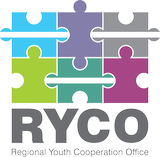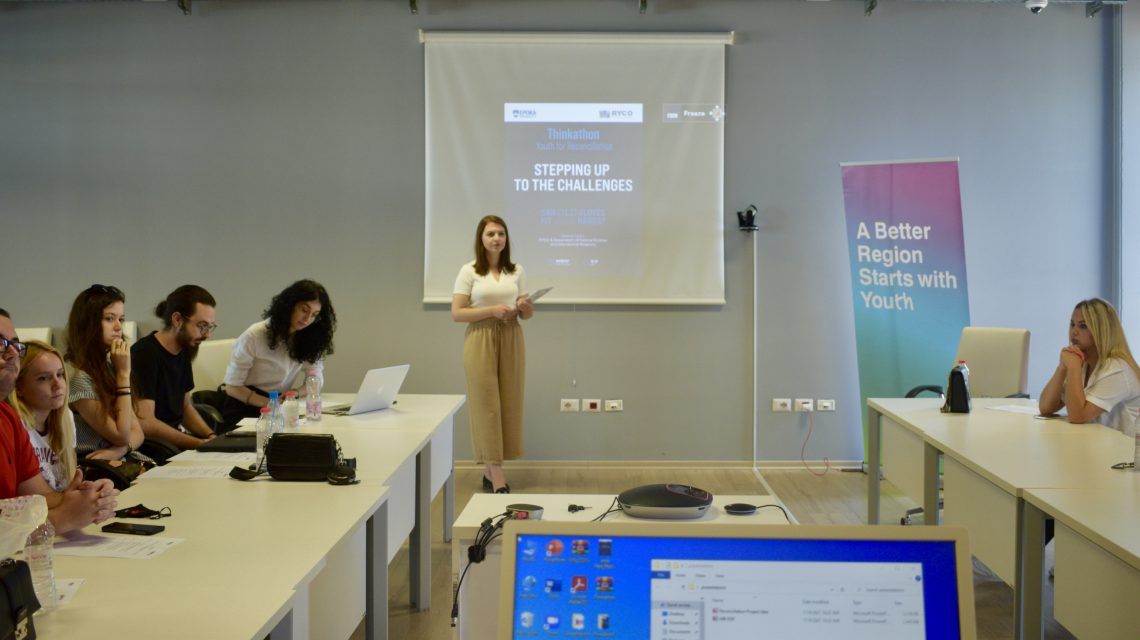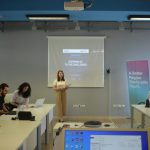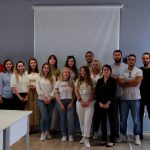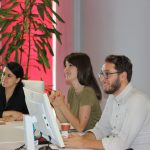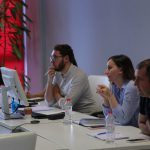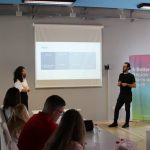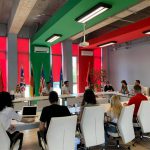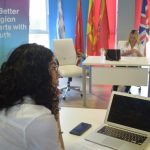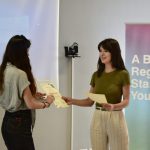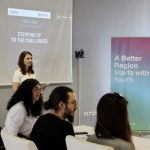TIRANA – Within the series of Reconciliation Seminars “Can Old Gloves Fit Young Hands: Learning about the Western Balkans from a Different Perspective”, RYCO Local Branch Office in Albania and Epoka University organized a thinkathon titled “Youth for Reconciliation: Stepping up to the Challenges” which took place on Monday, 19 July, at the premises of Epoka University in Tirana.
During the event, master students of Epoka University presented ideas for reconciliation and peacebuilding in front of a jury composed of Head of RYCO Local Branch Office in Albania Mr Kreshnik Loka, Youth Representative of Albania in RYCO Governing Board Ms Franceska Muço, Head of Center for European Studies at Epoka University Dr. Jubjana Vila and Lecturer of Diplomatic History Dr. Niuton Mulleti, with the moderation of Ms Sara Çela.
The opening remarks were delivered by Head of Political Science and International Relations Department at Epoka University Ms Reina Zenelaj Shehi and Head of RYCO Local Branch Office in Albania Mr Kreshnik Loka.
“We see our students as young people that can and will contribute to our society. RYCO will continue working on regional reconciliation and peacebuilding, but you will need to contribute along the way too. That is why we wanted and intended to offer a platform from which you will gain new knowledge, reflect, and become empowered,” Ms Zenelaj Shehi stated while addressing the young students.
“The only conclusion which I can reaffirm to myself is only one. By giving young people the right tools and information we can count on them as a strong partner in policy-making, and as active citizens that can fairly contribute to our societies. And I think that with this series of seminars we started doing so,” Mr Loka added.
In continuation, the young students, divided in four groups, presented their ideas and suggestions on projects that can help foster regional cooperation and reconciliation. What stood at the center of attention was their creativity in direction to two key programmatic areas of RYCO’s work: youth mobility and education. With their project ideas they ensured to tackle areas which can directly impact and contribute to a more open, connected and peaceful region. Two of the student groups focused on mobility and youth exchange whereas the other two focused on strengthening educational tools and intercultural dialogue.
The first group’s idea by Ms Franceska Picari and Mr Kristian Pano was titled “Reconciliation Hub” and revolved around youth exchanges of culture, ideas, and knowledge. The second idea presented by Mr Endri Ngresi, Mr Ervis Jangulli and Ms Ersilda Prenga titled “Western Balkan Youth Study Visits” aimed at fostering social bridges and intercultural learning among high school students. The third group composed of Ms Altea Bani, Ms Megi Hakrama and Mr Jon Çobani presented their idea “Reconciliation through Education” focused on improving educational services, tools and curricula while educating for peace. The fourth group composed of Ms Anda Kruetani and Ms Erida Metaj introduced “Western Balkans Route to Reconciliation” (WB-R2R), an initiative that would aim at fostering regional reconciliation through targeting youth via informative and collaborative actions supported by relevant ministries and agencies.
The jury applauded the young students’ initiatives and willingness to contribute with their ideas for regional reconciliation and peacebuilding. They awarded the idea on “Western Balkans Route to Reconciliation” (WB-R2R) with the first winning place.
The thinkathon “Youth for Reconciliation: Stepping up to the Challenges” served as the final concluding event of the whole series of the reconciliation seminars which brought together youth from Albania and the Western Balkans in interactive discussions with experts on the fields of reconciliation, peacebuilding, culture, arts and research.
The Reconciliation Seminars organized by RYCO Local Branch Office in Albania and Epoka University brought at the forefront the need for peace in the region, from a transformative perspective and youth-led discussions. Given the COVID-19 circumstances, most of the seminars took place from March to June 2021 in an online format.


